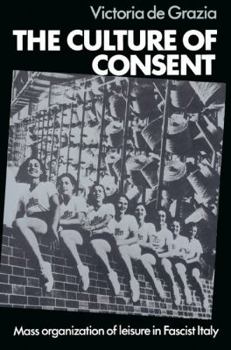The Culture of Consent: Mass Organisation of Leisure in Fascist Italy
Select Format
Select Condition 
Book Overview
The efforts of fascism to form a 'culture of consent, ' or shape depoliticized activities, in Italy between the world wars, make a unique portrait of fascist political tactics. Professor de Grazia focuses on the dopolavoro or fascist leisure-time organization, the largest of the regime's mass institutions. She traces its gradual rise in importance for the consolidation of fascist rule; its spread in the form of thousands of local clubs into every domain of urban and rural life; and its overwhelming impact on the distribution, consumption, and character of all kinds of recreational pursuits - from sports and adult education to movies, traveling theaters, radio, and tourism. The author shows how fascism was able, between 1926 and 1939, to build a new definition of the public sphere. Recasting the public sphere entailed dispensing with traditional class and politically defined modes of organizing those social roles and desires existing outside the workplace.
Format:Paperback
Language:English
ISBN:0521526914
ISBN13:9780521526913
Release Date:July 2002
Publisher:Cambridge University Press
Length:324 Pages
Weight:1.10 lbs.
Dimensions:0.8" x 6.1" x 9.0"
Related Subjects
Europe History Ireland Italy Politics & Social Sciences Social Science Social SciencesCustomer Reviews
0 rating





